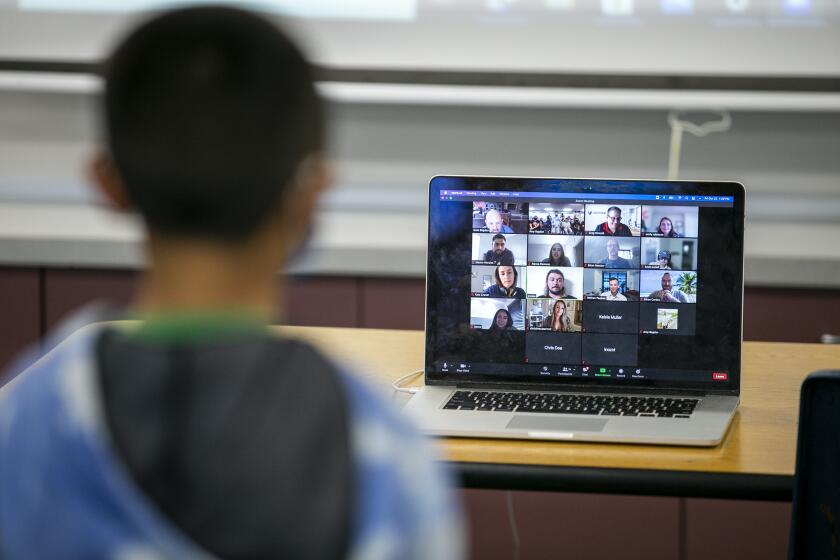Column: Debate over changing the school calendar is unseasonably hot
Forging a consensus on school calendars is as difficult to achieve as it is for other controversial time-related matters, from the incomprehensible rationale for changing our clocks twice a year to the excruciatingly long wait for the final season of “Game of Thrones.”
So it’s no surprise that Newport-Mesa Unified School District’s proposal to switch to what it’s calling a “collegiate calendar” is stirring an emotional response.
The term “collegiate calendar” is apparently a euphemism for “We’re going to push up the start of the school year to mid-summer.” You know, just like some — by no means all — colleges and universities do.
It probably didn’t help that the district first floated the idea of moving up the first day of school by three weeks, from the day after Labor Day to the middle of August — Southern California’s hottest month on average — during an October heat wave when many students baked in non-air conditioned classrooms.
Nevertheless, Newport-Mesa is forging ahead with its plan to seek input from the community through a survey and a series of informational meetings that opponents of the calendar change view more as a propaganda campaign. The Daily Pilot previously reported that many parents and students at one of these meetings, held recently at Corona del Mar High School, spoke in favor of the proposed calendar.
So I suspect that critics of the plan, who resent the seemingly constant assaults on family summer time, are right about at least one thing: This is already a done deal. For better or worse, Newport-Mesa will likely join a growing cavalcade of school districts that have been opting to begin their school years sooner than in times past.
There are often plenty of compelling reasons offered for making this change, and Newport-Mesa is no exception when it comes to justifying why moving up the start of school makes sense.
Among those reasons are:
- Starting earlier means the semester can end before winter break, relieving students of the stress of studying for finals over the holidays and teachers from time-wasting reviews.
- Additional days off could potentially be added during the fall and spring semesters.
- The school year can end earlier, allowing students to get a jump on summer activities and jobs.
- An earlier school calendar would better conform to the nationwide schedules for Advanced Placement classes taken by high school students.
All these points sound reasonable enough. But my skeptical nature leads me to think that behind these arguments lies one glaring, overarching motivation for beginning the school session earlier: Competition.
Let’s face it: schools have been in a hotly contested horse race for a long time now, and despite a good deal of hand-wringing throughout the educational community and a growing backlash by fed-up parents, that remains the reality. Moving up the instructional calendar is just one more facet of this quest to catch up with, or get a leg up on, the competition — which, in this case, is other schools.
Those previously mentioned Advanced Placement students take the big final tests for those college-level classes on the same day in May throughout the nation, which means that the kids at schools with earlier start dates have an inherent advantage.
Newport-Mesa officials might genuinely feel pity for students who have long sacrificed their summer vacations to study for their AP classes before school starts. But they are also likely moved by the hope that improved AP test results and pass rates afforded by more class time would give them a lot to brag about.
For public schools, much is also riding on the statewide standardized tests given each spring. Although a great deal of lip service has been given to de-emphasizing test scores in the still-new Common Core era, the stigma associated with low or stagnant results lingers like a stubborn stain.
And when certain schools and districts outperform their peers, school administrators simply can’t resist the temptation to boast far and wide about this supposed representation of educational excellence.
Just like AP tests, the standardized tests require considerable prep work. I doubt that Newport-Mesa officials are immune to the expectation that additional instructional time before those tests are taken will yield the kind of positive results that will make the schools — and by extension them — look good. Job security is powerful motivation.
To be sure, none of this is reason enough to completely discount the idea of changing the date for schools to start. There’s nothing written in stone that governs academic calendars. Indeed, there was a time when summer vacations weren’t an ingrained part of our culture, and school calendars were largely determined by the particular needs of the communities they served.
But times change, and the inclination nationwide to consider school calendars in terms of competitive advantage is now the norm. That’s the world we live in, and what we can continue to expect until, well, perhaps until we figure out a better way to win.
PATRICE APODACA is a former Newport-Mesa public school parent and former Los Angeles Times staff writer. She lives in Newport Beach.
All the latest on Orange County from Orange County.
Get our free TimesOC newsletter.
You may occasionally receive promotional content from the Daily Pilot.




